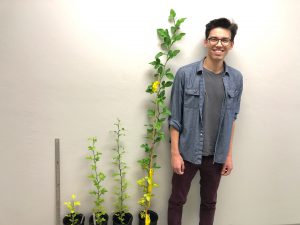University of Florida College of Agriculture and Life Sciences graduate student John Santiago has received the prestigious Grinter Fellowship for his work to earn a Doctor of Philosophy in Horticultural Sciences.

The Grinter Fellowship is named in honor of Linton E. Grinter, who served as Dean of the UF/CALS Graduate School through the early 1950s and through the 1960s. The award program was established to help recruit truly exceptional graduate students as top-ups to allocated graduate assistantships stipends, according the fellowship guidelines found in the CALS website.
“John Santiago is a truly exceptional Ph.D. student. I look forward to his research and results to protect Florida’s citrus industry,” said Lorenzo Rossi, who oversees Santiago’s graduate work. Rossi is an assistant professor of plant root biology at the UF Institute of Food and Agricultural Science’s Indian River Research and Education Center (UF/IFAS IRREC) in Fort Pierce, Florida.
Santiago’s doctoral work is also funded with a U.S. Department of Agriculture Multi-Agency Coordination grant, for research to help citrus production. More than 90% of the state’s citrus crop trees are affected by huanglongbing (HLB), or citrus greening. UF scientists are researching the problem to help growers produce fresh fruit while the trees are infected, and until a cure can be found for the disease.
Rossi said Santiago’s graduate student research plan involves soil microbes and their relationship to citrus trees. Santiago said microbes are microorganisms such as bacteria, actinomycetes, fungal communities, algae, and protozoa, each of which has a different function in soils. As much as 10 billion bacterial cells appear in a gram of soil in the rhizosphere, which is the environment around plant roots.
“I will aim for a minor in agronomy because I will look at soil microbes concerning citrus production,” said Santiago. “Much of my knowledge with plant microbe interactions was discovered during my master’s degree with rhizosphere studies.”
The rhizosphere is a dynamic region where complex interactions occur between plants and other organisms close to tree roots. For example, microbes have the capacity to promote healthy plant growth and to help trees resist disease, said Rossi.
“As far as predictions go, soil environments that have the most resources available, such as organic matter, water concentration, and often temperatures, are more varied,” said Santiago. “Frequently, there are more microbes that can correlate with growth, and in my experiment, I predict that we will find that the more varied rhizospheres will hold healthier trees.”
Santiago was employed as a soil conservationist with the USDA at three different offices throughout the state, in Gainesville, Sebring and Labelle. He gained skills with GIS software at work with the public to implement conservation projects. Earlier positions included internships at parks in Jacksonville, Florida.
Santiago completed both master’s and bachelor’s degrees in soil and water science with UF. He also holds an associate in arts in environmental science technology, and an associate in arts degree, both from Florida State College at Jacksonville. Soil protection and the way it relates to food and human safety is the thrust for Santiago’s career, he said.
“There are ways to grow food and protect the environment at the same time — my main goal is to help maintain agriculture while being more efficient in waste reduction that can negatively impact our environment,” said Santiago. “The way to do that is with microbe research because many micronutrients form mutual relationships with plant hosts, or crops, and potentially reduce costs and waste in the future.”
 5
5
